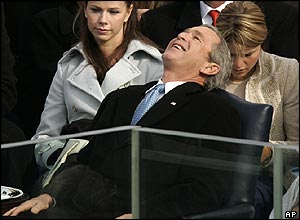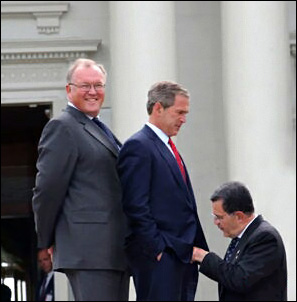The disgraceful but predictable campaign of defamation and lies against President Ahmadinejad of Iran continues unabated. Words and phrases are plucked out of the context of long speeches, without any attention to the overall gist and purpose of each speech, merely to be used as ammunition for propaganda against someone whose only crime is that he does not, nor does he plan to, bow down to the will of the Western politico-financial complex, either in action or in spirit, but rather plans solely to follow the dictates of his conscience regarding the good of his nation as well as that of the region at large.
Mohammad Khatami, the former President of Iran, again and again urged a “dialogue of civilizations.” Khatami’s own mentality, however, was captive to the Western monologue, and his call fell on deaf ear in the West.
Ahmadinejad’s monumental task is to turn the monologue into a true dialogue. As the West is completely unaware of the existence of a point of view other than its own, Ahmadinejad faces the task of using harsh language to try to break through the legacy of decades of brainwashing.
Communication of complex ideas is not an easy task. Had the Western media been unbiased reporters of facts, the task of conveying ideas across cultural barriers would still have been prone to error and misunderstanding. But the even greater problem is that the Western media are very far from being unbiased reporters of facts. Rather, they approach world events through the particular ideological prisms of their financial and political masters.
A further difficulty that Ahmadinejad faces is unwittingly of his own making. He is a scholar with little political experience, and he always speaks as a scholar, which places a barrier between him and ordinary people. Scholars deal in concepts and meanings. Ordinary people deal in feelings and emotions. Scholars see the world in terms of conceptual and impersonal structures. Ordinary people see the world in terms of emotional and personal frameworks. Scholars faced with political problems imagine, rightly or wrongly, that correct conceptualizations can solve those problems. Hence they see their task as the furthering of the formulation of those conceptualizations, but in a language that they hope would make it possible for the public at large to participate in the process.
A short while ago, the Western media reported Ahmadinejad as having spoken of “wiping out Israel.” In reality, in a speech whose theme was the urgency of finding a political solution to the Palestinian nightmare, he had simply employed a quotation from the Ayatollah Khomeini in order to illustrate a point. He could not possibly have foreseen that his words would be taken out of context and mistranslated to be trumpeted across the world. Again, one must keep in mind that he speaks as a scholar and deals in ideas. When he used the quotation about “wiping out Israel,” he was speaking of the necessity of a radical modification in what the concept of “Israel” represents. He was not speaking of some kind of physical destruction of a physical entity.
If one sets aside the anti-Moslem blinkers and looks squarely at the facts, one will notice that President Ahmadinejad's polemics simply represent the view that things cannot go on the way they have been, and a solution to the plight of the Palestinian people is not only desirable but inevitable.
More recently, he was accused of having denied the Holocaust by calling it a “myth.” Again, it is absolutely imperative to keep in mind that Ahmadinejad speaks as a scholar. To the average person on the street, whose thoughts are vague and whose feelings are strong, the word “myth” is a synonym for “lie” or “fantasy.” To the scholar, on the other hand, the word “myth” has a specific meaning, or rather several specific meanings, depending on the specific context.
Recall that he was not speaking of myth in general, but rather of myth in relation to a specific nation, that is, the Jewish nation. In other words, he was speaking of a national myth.
Again, to the person on the street, the phrase “national myth” simply signifies a lie or fantasy about a particular nation. To a scholar, on the other hand, the phrase has a very specific meaning, which has nothing at all to do with lies or fantasies. “A ‘national myth’ is an inspiring or patriotic story … that serves as a national symbol of a country, and re-affirms a country's ‘national values.’” A national myth is sometimes called a “founding myth,” and is not a “myth” in the sense of being false.
For instance, Canada’s “national myth” revolves around Loyalist migrations to Canada, the War of 1812, and so on. These events really happened, of course, and the word “myth” is not used disparagingly in referring to them. A "national myth" is, rightly or wrongly, the foundation of a nation's identity. The only possible disputes revolve around questions such as whether these events really deserve the place they have been assigned in a nation's history, or whether they have been correctly interpreted, and so on. And that is exactly the kind of point that Ahmadinejad was trying to make regarding the “national myth” of the state of Israel. As a scholar, his aim is not to dispute historical facts. Rather, he wants to try to clarify the conceptual structures that historical facts are embedded in.
Nowhere does he deny the Holocaust. Nowhere does he call it a “myth” in the sense of being false. Just the opposite, as a matter of fact. The subject of his speech was the West's attitude towards and exploitation of religion. He was also trying to defend himself against the charge of anti-Semitism. He wanted to point to what he sees as the hypocrisy of the West, which, in its pursuit of secularism, abandoned all religions, including Judaism, a long time ago, while continuing to draw every possible political advantage out of the suffering of the Jewish people.
In his view, it is the West that has turned the Holocaust into a falsehood. It is the West that has turned the real sufferings of millions of real people into a political weapon.
By putting together his statements regarding "wiping out Israel" and "the myth of Holocaust," we arrive at the essence of his thought on this subject, which is that Israel should give itself a new national myth. By giving itself a more positive and inclusive national myth, Israel may finally succeed in freeing itself from vassalage to the West and assert itself as a true nation.
An editorial in a Canadian newspaper recently coined the term "Iran's dark days,” referring to the period of "the late 1970s and early 1980s, which was highlighted by the seizure of the American embassy."
A point that may be incomprehensible from a Western-centric perspective is that the seizure of the US embassy was the least important event of that period to the people of Iran. The real highlight of that period was that the people of Iran managed to throw off the yoke of the Shah's US-imposed tyranny and regain their national dignity and independence, a unique and unprecedented achievement in the Middle East.
The darkness of those days, from the Iranian people's perspective, stemmed from the distortions that the Islamic Revolution's original purpose suffered because of Saddam's invasion and other US-inspired pressures.
The way I see it, President Ahmadinejad's focus is on reviving what the Islamic Revolution was really about. Briefly, that essence consisted of freedom, independence, and the creation of a political system where the principles of Islam would be the final arbiters of right and wrong.
If that does not suit the interests of the West, so be it.
Update (January 2): As I have explained in this post, it is a myth that President Ahmadinejad called the Holocaust a myth. And, as I mentioned in a comment to this post, the myth was created by a translator at the New York Times' Tehran office. The lie has now caught up with the Western media. People are asking "Wasn't it this guy who was just denying the Holocaust? How is it that now he is calling Israel a continuation of the European genocide of Jews? If he is a Holocaust-denier, how can he be talking about a genocide?"
The fact is that a foreign leader has made certain statements in the last couple of months in a foreign language. The statements have been translated by the newsmedia of his country’s enemies. Because of the contradictions that have arisen between the translated statements, some people are trying to understand what the foreign leader has really said. Another group of people, possibly anti-Semites, are trying to fish the muddy waters or exploit the situation. The fact that anti-Semites use similar words to the words attributed to Ahmadinejad does not mean they say the same thing. A third group, whose motivations are also suspect, do nothing but hurl abuse at anyone who tries to get an objective understanding of what is really going on.
• My other posts on related topics:
McCain's License to Torture?
What do you care?
Unity, progress, and purpose
The Poodle's UNcle
Commandress in Chief
Opportunism, thy name is Dubya!
Ayatollah Robertson
Each post in this blog is only a starting point for discussion in the comments section. Comments on both old and new posts are welcome. Topics: Propaganda • Iraq • Media • Militarism • Iran • Israel • Religion • Strategy • Islam • Racism • Venezuela
December 28, 2005
December 22, 2005
December 18, 2005
McCain's License to Torture?
American liberals may well accuse Senator McCain of having served as a useful tool for the Bushites on the torture issue, in that, by diverting the public's attention away from the real problem — the US Administration’s preposterous definition of torture — he has made it impossible to discuss the issue that really should be discussed. But that is only one part of the story. Yes, it is true that Bush can now simply claim that the US "does not torture," skirting completely around the question of what he means by the word "torture." The Bushites have manipulated the definition of torture so as to make it meaningless. And it is true that, meanwhile, activities that any rational person would consider to be torture will continue as before.
But this whole discussion conveniently neglects the fact that US governments of both political stripes have always made extensive use of torture, whether by their own agents or through proxies. The current debates make it appear as if torture were something new for the US. McCain cannot have been unaware of this history, knowing what he does about torture.
Perhaps his whole campaign around restoring "America’s honour" has really been about trying to stave off the risk of this grisly history — and the real nature of the American system of government — penetrating the public's consciousness any more than it has already.
To look at it another way, McCain, by obliterating both the history and the present in a single stroke, has given carte blanche, not only to this particular Administration, but also to all future (and past) US governments, to employ torture whenever, however, and wherever they wish. Quite an achievement for one who is purportedly such a vehement opponent of the practice.
http://www.parascope.com/articles/0397/kubark04.htm
• My other posts on related topics:
Commandress in Chief
Opportunism, thy name is Dubya!
But this whole discussion conveniently neglects the fact that US governments of both political stripes have always made extensive use of torture, whether by their own agents or through proxies. The current debates make it appear as if torture were something new for the US. McCain cannot have been unaware of this history, knowing what he does about torture.
Perhaps his whole campaign around restoring "America’s honour" has really been about trying to stave off the risk of this grisly history — and the real nature of the American system of government — penetrating the public's consciousness any more than it has already.
To look at it another way, McCain, by obliterating both the history and the present in a single stroke, has given carte blanche, not only to this particular Administration, but also to all future (and past) US governments, to employ torture whenever, however, and wherever they wish. Quite an achievement for one who is purportedly such a vehement opponent of the practice.
http://www.parascope.com/articles/0397/kubark04.htm
• My other posts on related topics:
Commandress in Chief
Opportunism, thy name is Dubya!
December 12, 2005
Kristallnacht Aussie Style

Australia's Fueh... er... Prime Minister John Howard has refused to attribute the race riots to racism. Hmm... Anyway, below are some highlights of Howard's career, which may shed some light on the current events.
He predicted, in 1985, that "The times will suit me." Not that the times do suit him, but that they will. He has made his self-fulfilling prophecy come true by pursuing policies such as:
Obviously, the race riots have nothing to do with racism. If they did, John Howard would know...
December 11, 2005
Syriana
There is nothing better than seeing this movie if you are looking for a brief (and entertaining) course on:
- The actual function and nature of terrorism in the Middle East
- The reasons for US meddling in the region
- The role of the oil industry, both on its own and as a US government partner
- The interconnections among all of these factors
I saw it last night, and loved it. The cast is star-studded, with George Clooney, Christopher Plummer, and others (if you are a trekkie like me, there is also the familiar face of Alexander "Dr Bashir" Siddig). The story is a fictionalized version of the facts revealed or uncovered by former CIA agent Robert Baer in his books.
- The actual function and nature of terrorism in the Middle East
- The reasons for US meddling in the region
- The role of the oil industry, both on its own and as a US government partner
- The interconnections among all of these factors
I saw it last night, and loved it. The cast is star-studded, with George Clooney, Christopher Plummer, and others (if you are a trekkie like me, there is also the familiar face of Alexander "Dr Bashir" Siddig). The story is a fictionalized version of the facts revealed or uncovered by former CIA agent Robert Baer in his books.
December 01, 2005
Boundless Arrogance II


There are thousands of such pictures. On one side, American thugs and murderers committing every possible atrocity against the helpless people of Iraq, without feeling bound by any principles of humanity or even common decency. On the other side, their President, a thug and murderer of long standing, laughing and smirking it all off.
• My other posts on related topics:
What do you care?
Unity, progress, and purpose
The Poodle's UNcle
Subscribe to:
Posts (Atom)

